
The morepork, better known as the morepork owl, and also known by numerous other onomatopoeic names, is a smallish, brown owl species found in New Zealand, and to the northwest, on Norfolk Island, an Australian territory. It was also, formerly, found on Lord Howe Island. Three subspecies of the morepork are recognised, one of which is extinct and another that exists only as a hybrid population.
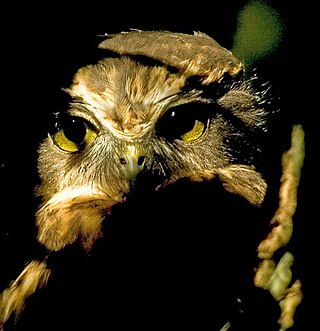
Ninox is a genus of true owls comprising 36 species found in Asia and Australasia. Many species are known as hawk-owls or boobooks, but the northern hawk-owl is not a member of this genus.

The New Britain boobook, also known as the spangled boobook, russet boobook, New Britain hawk-owl or russet hawk-owl, is a small owl that is endemic to New Britain, the largest island in the Bismarck Archipelago in Papua New Guinea.
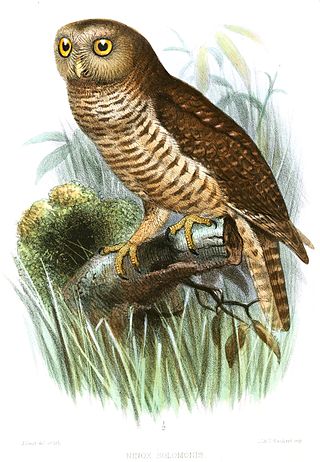
The New Ireland boobook or New Ireland hawk owl also known as the Bismarck boobook, Bismarck hawk owl or barred boobook, is a small to medium-sized owl measuring 25 to 30 cm in length. It is a dark rufous-brown above, with barred scapular feathers and variable amounts of spotting or barring on the wings and tail. Its underparts are whitish, with an unmarked pale throat, a dark barred upper breast and barring on the remainder of the underparts. Its face is dark brown, its eyes are brown or yellow, and its bill and legs are yellow. It is short-tailed and has heavy tarsi.

The speckled boobook or speckled hawk owl, also called the Oriental hawk-owl, is a small owl at 17–20 cm (6.7–7.9 in). It is a reddish-brown hawk-owl with a white-spotted head, back and wings, a white throat patch, black facial disk, dark brown eyes and white eyebrows.

The cinnabar boobook, also known as the cinnabar hawk-owl, is a hawk-owl endemic to the island of Sulawesi, Indonesia. It was described as a new species to science by American ornithologist Pamela C. Rasmussen in 1999 based on a single specimen collected by Frank Rozendaal from Bogani Nani Wartabone National Park on Minahassa Peninsula, northern Sulawesi, in 1985. Subsequently, it has also been observed in Lore Lindu National Park in central Sulawesi, greatly expanding the known habitat range.

The Christmas boobook, also known as the Christmas hawk owl, Christmas Island boobook or Christmas Island hawk owl, is a species of owl in the family Strigidae.
The least boobook, also known as the little Sumba hawk-owl or little Sumba boobook, is a species of owl in the family Strigidae. It is endemic to the Indonesian island of Sumba. Its natural habitat is subtropical or tropical moist lowland forests. It is threatened by habitat loss.
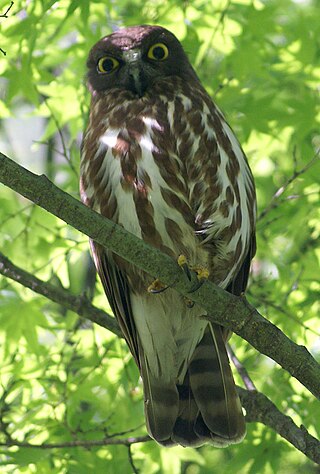
The northern boobook belongs to the family Strigidae and is a raptorial owl endemic to eastern and southern countries of Asia. The species was considered, until recently, a conspecific of Ninox scutulata or brown boobook, a species of similar distribution encompassing 11 subspecies. The species currently includes two subspecies, the migrant Ninox japonica japonica and the non-migrant Ninox japonica totogo. Despite being considered as the most common breeding owl in Japan, little research has been conducted on the species and subspecies and the taxonomic classification of N. j. totogo and N. j. japonica has been a subject of debate. There are no indications of significant decline in northern boobook populations and therefore its conservation status has been classified as least concern by the IUCN Red List.

The Halmahera boobook is a species of owl in the family Strigidae. It inhabits the Indonesian islands of Halmahera, Ternate and Bacan. Its natural habitat is subtropical or tropical moist lowland forests. It is threatened by habitat loss. It was previously considered to be a subspecies of the Moluccan boobook.
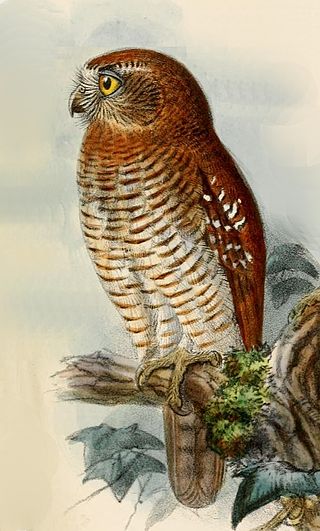
The Seram boobook, also Hantu boobook, Moluccan boobook or Moluccan hawk owl, is a species of owl in the family Strigidae. It is found on the Indonesian islands of Seram, Kelang and Ambon. Its natural habitat is subtropical or tropical moist lowland forests. It is threatened by habitat loss. It used to be considered a subspecies of the Moluccan boobook.
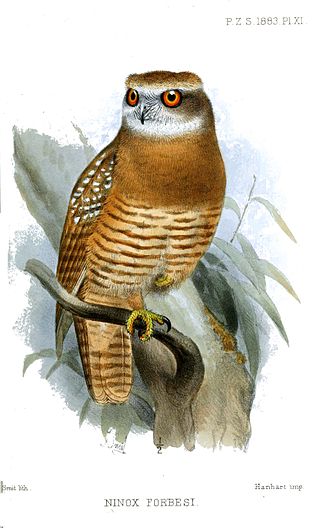
The Tanimbar boobook, or Tanimbar hawk-owl, is a species of owl in the family Strigidae. It is found in the Tanimbar Islands of Indonesia. Its natural habitat is subtropical or tropical moist lowland forests. It is threatened by habitat loss. It used to be considered a subspecies of the Moluccan boobook.
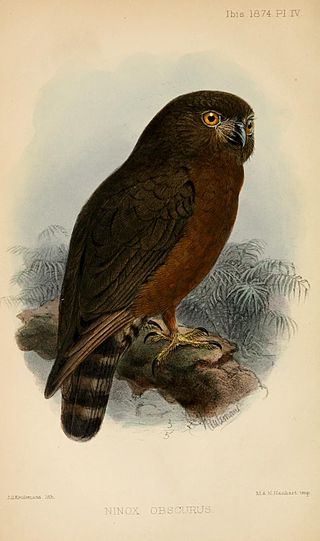
Hume's boobook or Hume's hawk-owl is a species of owl in the family Strigidae endemic to the Andaman Islands. Its natural habitats are subtropical or tropical moist lowland forests and subtropical or tropical mangrove forests. It is becoming rare due to habitat loss.
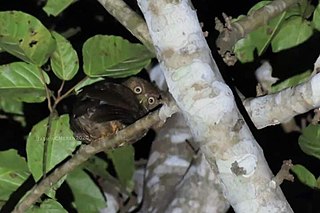
The Camiguin boobook or Camiguin hawk-owl is an owl species resident to the Camiguin island in the Philippines. It is the only owl in the country with greenish-yellow or grayish eyes. It was previously known as a subspecies of the Philippine hawk-owl, but was reclassified in 2012, as voice and other evidence suggested it a distinct species. Its native name is kugkug

The Luzon boobook or Luzon hawk owl, also Philippine hawk owl or Philippine boobook, is a species of owl in the family Strigidae. It is endemic to the Philippines where it lives in forests. It is a brown and white mottled bird and males and females look much alike.

The Mindanao boobook or Mindanao hawk-owl is a species of owl in the family Strigidae that is endemic to the Philippines on the island of Mindanao. It was previously known as a subspecies of the Philippine hawk-owl, but was reclassified in 2012, as voice and other evidence suggested it a distinct species. It is found in tropical moist lowland forest. It is threatened by habitat loss.

The Mindoro boobook or Mindoro hawk-owl is a species of owl in the family Strigidae that is endemic to the Philippines.

The Romblon boobook or Romblon hawk-owl, is a species of owl in the family Strigidae that is endemic to the Philippines. It is only found on the islands of Tablas, Sibuyan and Romblon. It was previously known as a subspecies of the Philippine hawk-owl, but was reclassified in 2012, as voice and other evidence suggested it was a distinct species. Its natural habitat is tropical moist lowland forest. It is threatened by habitat loss.

The Cebu boobook or Cebu hawk-owl is a species of owl in the family Strigidae. It is endemic to the Philippines. It was formerly considered a subspecies of the Philippine hawk-owl, but was reclassified in 2012, as voice and other data suggested placement in a distinct species.

The Sulu boobook or Sulu hawk-owl is a species of owl in the family Strigidae. It is endemic to the Sulu Archipelago in the Philippines. It was previously known as a subspecies of the Philippine hawk-owl, but was reclassified in 2012, as voice and other evidence suggested it was a distinct species. It is found in tropical moist lowland forest. It is threatened by habitat loss.



















